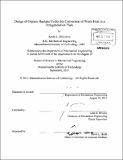Design of organic Rankine cycles for conversion of waste heat in a polygeneration plant
Author(s)
DiGenova, Kevin (Kevin J.)
DownloadFull printable version (17.56Mb)
Other Contributors
Massachusetts Institute of Technology. Dept. of Mechanical Engineering.
Advisor
John G. Brisson.
Terms of use
Metadata
Show full item recordAbstract
Organic Rankine cycles provide an alternative to traditional steam Rankine cycles for the conversion of low grade heat sources, where steam cycles are known to be less efficient and more expensive. This work examines organic Rankine cycles for use in a polygeneration plant that converts coal feedstock into hydrocarbon products and electricity. Since a Fischer Tropsch reactor is the largest source of low grade heat in the polygeneration plant, rejecting heat at a constant temperature of 240°C, the analysis in this work focuses on utilizing the waste heat from this process. Organic Rankine cycles (ORC's) are modeled in MATLAB using pure substance data available from Refprop 8.0. Various working fluids are considered, with a particular focus on hexane, heptane, octane, nonane, and decane. Hexane is the best option for the Fischer Tropsch heat source and the working fluids considered here. A set of ORC design concepts (building blocks) is developed to allow a cycle to be matched to a generic heat source, and is demonstrated using the Fischer Tropsch heat source profile. The low pressure steam Rankine cycle achieves a 20.6% conversion, while a baseline hexane organic Rankine cycle achieves a 26.2% conversion efficiency for the same Fischer Tropsch heat source. If the ORC building blocks are combined into a cycle targeted to match the temperature-enthalpy profile of the heat source, this customized hexane cycle achieves 28.5% conversion efficiency. For a polygeneration plant with a 25,000 ton per day input of coal, the conversion efficiency is improved by 0.3 to 0.5 points. Moreover, by combining the ORC building blocks identified in this work into new configurations, cycle designers can create customized organic Rankine cycles that target any heat source temperature-enthalpy profile to achieve improved conversion efficiencies.
Description
Thesis (S.M.)--Massachusetts Institute of Technology, Dept. of Mechanical Engineering, 2011. Cataloged from PDF version of thesis. Includes bibliographical references (p. 124-126).
Date issued
2011Department
Massachusetts Institute of Technology. Department of Mechanical EngineeringPublisher
Massachusetts Institute of Technology
Keywords
Mechanical Engineering.